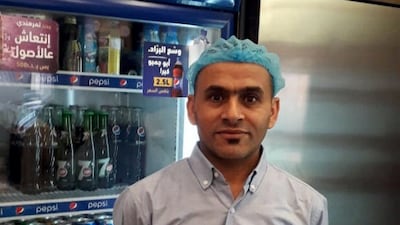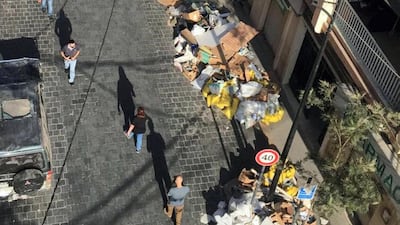Just one week after reopening, it is almost as if Le Chef, one of Beirut's oldest and most famous restaurants, never closed.
Restaurateur Charbel Bassil, son of the late founder Francois Bassil, greets regulars by name, making deadpan jokes as he shouts orders periodically to his brother Paul, who runs the kitchen.
"Wahed batata (one order of fries)!" yells Charbel across the restaurant. For regulars who have heard this popular order endless times, it is a clear announcement that the old restaurant is back in business, months after it was heavily damaged during the devastating explosion in Beirut on August 4.
The small eatery on Rue Gouraud was nearly full at lunchtime earlier this week, a rare sign of hope in a country teetering on economic collapse.
Le Chef opened last week with funding from admirers and loyal customers after it was nearly obliterated in the explosion at Beirut's port, which killed more than 200 people and injured at least 6,500.
The reopening of Le Chef is a victory for small businesses in the capital that are trying to overcome the effects of the blast, as well as a financial crisis that has caused enormous currency devaluation since the end of last year.
In the five decades since Paul and Charbel’s father founded the rustic canteen, nestled at the heart of Beirut’s lively Gemmayze district, Le Chef has become a cultural and culinary landmark.
Its customers encompass labourers, white-collar workers, writers, artists, expatriates and tourists, making it an inclusive attraction in the capital.
The small restaurant offers western cuisine but is renowned for its traditional Lebanese dishes, such as moghrabieh, the local version of couscous, with chicken and a thick sauce. Hummus with meat is a bestseller, but around the Christmas season, stuffed turkey with chestnuts becomes the main attraction.
Customers return not only for the food, but to visit those who prepare it. Le Chef even has a dedicated "fan club". On a shelf, by the entrance, sits a tongue-in-cheek award from said fans for the "outstanding use of the word welcome and best client servicing", granted to Charbel.
"I am the 'welcome man' of Beirut, it's my famous word. It comes from the heart," Charbel tells The National, adding that Le Chef has weathered crises and civil wars, "but nothing like August 4".
“Thank God we are still alive,” he says.
Charbel was wounded in the head, leg and arm by the explosion, caused by the ignition of 2,750 tonnes of ammonium nitrate, while one of his Syrian employees went into a two-day coma.
The blast reduced large parts of the city to rubble, with many businesses and homes left in tatters as owners could not afford to rebuild in a time of financial meltdown.
Le Chef could have suffered the same fate, but following news that the restaurant was destroyed, sympathy – and aid – poured in from near and afar. Actor Russell Crowe donated $5,000 (Dh18,364) to repair the premises, a quarter of the total funds donated to restore Le Chef.
The Gladiator actor made the donation in memory of celebrity chef Anthony Bourdain, who featured Le Chef twice on his show No Reservations.
“The fundraiser saved us; it saved Le Chef.” Charbel says. “Russell Crowe is our godfather. We offer him the keys to the restaurant. He helped us to have a new start.”
Scars from the explosion still mar Gemmayze, but the reopening of one of the district’s most famous businesses is helping revive the area.
Retired officer Amine Ayash came to Le Chef for lunch from the nearby neighbourhood of Basta Al Tahta, drawn back to a restaurant known for its inclusive approach.
“Charbel and his family are a pillar of Gemmayze,” Ayash said as he dipped his fingers into mutabbal, the trademark grilled aubergine, tahina, garlic and olive oil dish of the Levant.
“They welcome everyone regardless of their sect and nationality.”














